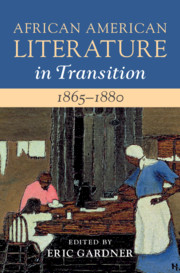Book contents
- African American Literature in Transition, 1865–1880
- African American Literature in Transition
- African American Literature in Transition, 1865–1880
- Copyright page
- Contents
- Figures
- Contributors
- Preface
- Chronology
- Black Reconstructions: Introduction
- Part I Citizenships, Textualities, and Domesticities
- Part II Persons and Bodies
- Part III Memories, Materialities, and Locations
- Chapter 9 The Civil War in African American Memory
- Chapter 10 African American Literature of the West and the Landscape of Opportunity
- Chapter 11 Reconstructions of the South in African American Literature
- Chapter 12 “This Is Especially Our Crop”: Blackness, Value, and the Reconstruction of Cotton
- Index
Chapter 12 - “This Is Especially Our Crop”: Blackness, Value, and the Reconstruction of Cotton
from Part III - Memories, Materialities, and Locations
Published online by Cambridge University Press: 18 March 2021
- African American Literature in Transition, 1865–1880
- African American Literature in Transition
- African American Literature in Transition, 1865–1880
- Copyright page
- Contents
- Figures
- Contributors
- Preface
- Chronology
- Black Reconstructions: Introduction
- Part I Citizenships, Textualities, and Domesticities
- Part II Persons and Bodies
- Part III Memories, Materialities, and Locations
- Chapter 9 The Civil War in African American Memory
- Chapter 10 African American Literature of the West and the Landscape of Opportunity
- Chapter 11 Reconstructions of the South in African American Literature
- Chapter 12 “This Is Especially Our Crop”: Blackness, Value, and the Reconstruction of Cotton
- Index
Summary
Katherine Adams’s “‘This Is Especially Our Crop’: Blackness, Value, and the Reconstruction of Cotton” thinks deeply about that historical record’s ties to materiality, labor, and “worth.”Adams focuses on writing that promoted cotton as a site for Black economic self-determination – specifically on how writers negotiated the double bind of racial capitalism, simultaneously countering predictions that freedpeople could not become economic producers without white coercion and resisting the reduction of Black personhood to economic value. Analyzing texts from Martin Delany, Frances Ellen Watkins Harper, and diverse other authors for the Black periodical press, Adams shows how African American writers and thinkers complicated the putative opposition between capitalist and human value by laying claim to both, appropriating the logic of cotton capitalism in order to inscribe Black personhood within its aporia.
Keywords
- Type
- Chapter
- Information
- African American Literature in Transition, 1865–1880Black Reconstructions, pp. 284 - 310Publisher: Cambridge University PressPrint publication year: 2021



